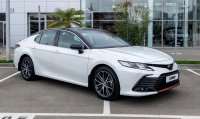 There is probably no other car on the market that evokes as much emotion from those around it. It's one step from love to hate. So, Camry, probably, is the unique car in the world which causes only positive emotions to some people, and at the same time - sharply negative emotions to others. Let's try to look at the model soberly and to understand the reason of this exceptionality. We asked our observant colleagues to tell us about it.
There is probably no other car on the market that evokes as much emotion from those around it. It's one step from love to hate. So, Camry, probably, is the unique car in the world which causes only positive emotions to some people, and at the same time - sharply negative emotions to others. Let's try to look at the model soberly and to understand the reason of this exceptionality. We asked our observant colleagues to tell us about it.

For generations on end, the Camry (and it should be called - or rather, to transcribe the name - just so) has been a bestseller in the domestic market. It's been bought - and bought well - even before the advent of many taxi aggregators.
Yes, it didn't have an outstanding design. It didn't have polished handling or super-fast speed ratings. But it was bought by companies large and small, by government agencies, as company cars. Individuals who were trying to show off what they thought was their enhanced social status and financial well-being.
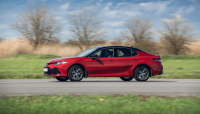
So why did they do it? The sedan, indeed, provided a very decent ride, had a sufficient range of basic and optional equipment, was large and not very expensive, compared to its main competitors. Those are the pros.
But the haters will give a lot of arguments at once and will notice quite fairly that it wasn't very convenient to drive the car, that instead of real wooden inserts Camry all the way "flaunted" their plastic imitation on the dashboard, foredome and doors, quite inexpensive and even poor interface.
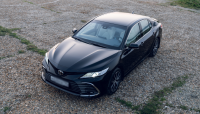
Both will be a hundred times right. But such people cannot be mistaken all at once, can they? In fact, 40 percents of all sales are accounted for by regular, very loyal customers.
Nevertheless, apparently having taken into account all the claims, the company decided to increase the number of its supporters. And so, this year, an updated version of the Camry appeared. However, considering quantity of innovations, it is time to call the car not updated but new.
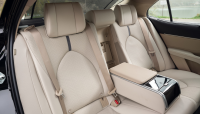
Judge for yourselves: the version with a 2,5 litre motor has advanced eight-step "automatic device" - earlier it was privilege of Lexus LS. They have also worked on the power unit itself. Henceforth it already produces 200 horsepower that could not but affect dynamics and maximum speed.
The steering wheel and suspension have been also reconfigured. Yes, not a trace remained from former bumpiness; the automobile became better "to see" all roughness and potholes on asphalt. But thus it, really, began more "tenaciously" to stick to a cloth, and exchange rate stability here is at a height.

There are not so many changes in the interior, but they are there. The first - rejoice, haters - inserts under pseudo-wood have become less. No, they are, certainly, there are, but they do not look so cheap any more. A new 9-inch multimedia display is now on the foredome. Moreover, it was put on the top of the panel for some reason and it blocks the view quite strongly. But now it is possible to connect any smartphone to the system - which is an achievement for the model.
In general, the car has been really worked on, and they have worked seriously enough. Of course, it has not become a supercar from it, but it also does not need it. But it became much clearer to drive, and it has added adequacy.
Will it add supporters? I don't know. Probably, the changes I've listed will not be enough to drag ardent haters into the ranks of admirers. But they work on the car, making it better every year - I can't help admitting it. However, it is for you to decide in any case. In fact, you vote for any car with yours, not with my purse.
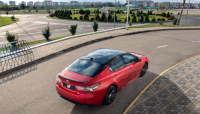
It hasn't been a year since Toyota improved the performance of its 2.5-litre engine, rewarding it with 200bhp. And they haven't forgotten about the transmission - there's now an eight-speed automatic transmission. All of this - along with three other major factors - will again play to the Japanese model's advantage.
What are these factors: liquidity, safety and reliability. I think nobody will argue with the first one, as almost all models of this Japanese brand are sold very successfully on secondary market. And also quickly if the question is about a live copy.
Toyota Camry
There are no problems with the second item, Camry perfectly passes all crash-tests, including independent from insurance companies.
Well, they have minimum claims to reliability, but not because Toyota has created such an image of strong cars. Everything depends on sales, both in Europe and abroad. The Camry is being bought by both private drivers and taxi companies, as well as by various companies. And even such harsh operating conditions, as work in distribution, do not bring any unexpected surprises to their owners.

As for usage, the Camry is quite comfortable in this respect. The driving position is comfortable, which is not the case in every car. The seat is set instantly - and it is already comfortable to twist a steering wheel and to use those functions, which the manufacturer has carefully introduced for your money. One would like more modern design of an interior, but the Japanese giant has never been afraid to go out of step with time, and it means that while there are sales and the weighty share of the market, one should not wait for cardinal changes.
Pleasant to drive but noisy inside: you'd expect a little more silence from a large sedan. Accelerates to 60km/h in less than 4 seconds, which is more important than the 0-100km/h milestone. It steers well both on a place and at speed, but it is better not to fly into sharp turns at full throttle. Thus active changes are given easily, all within the norm. And the work of a suspension is sincerely pleased in everything, and even a road with a bad covering seems quite good.
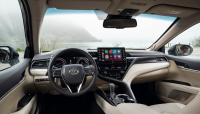
Like any other car, the Camry is rich in pros and cons. And no matter what, it's successful.
Would you like a lower price tag? Absolutely. But even in spite of the dealer mayhem, in spite of price hikes in the official price list, the model sells well and will continue to do so until, probably, the manufacturer takes it out of production. But it won't - it's a Camry, after all.
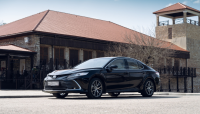
,-but-more-substandard-2.png)
